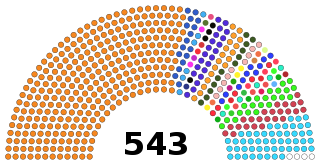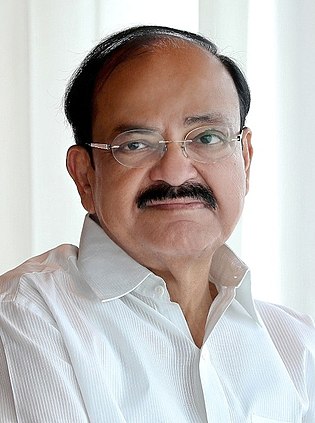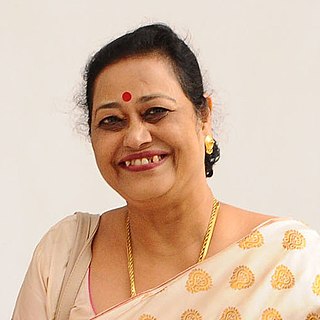Related Research Articles

The Rajya Sabha or Council of States is the upper house of the bicameral Parliament of India. It currently has a maximum membership of 245, of which 233 are elected by the legislatures of the states and union territories using single transferable votes through Open Ballot while the President can appoint 12 members for their contributions to art, literature, science, and social services. The potential seating capacity of the Rajya Sabha is 250, according to article 80 of the Indian Constitution. Members sit for staggered terms lasting six years, with elections every year but almost a third of the 233 designates up for election every two years, specifically in even-numbered years. The Rajya Sabha meets in continuous sessions, and unlike the Lok Sabha, being the lower house of the Parliament, the Rajya Sabha, which is the upper house of Parliament, is not subjected to dissolution. However, the Rajya Sabha, like the Lok Sabha can be prorogued by the President.

The Lok Sabha, or House of the People, is the lower house of India's bicameral Parliament, with the upper house being the Rajya Sabha. Members of the Lok Sabha are elected by an adult universal suffrage and a first-past-the-post system to represent their respective constituencies, and they hold their seats for five years or until the body is dissolved by the President on the advice of the council of ministers. The house meets in the Lok Sabha Chambers of the Sansad Bhavan, New Delhi.

The Parliament of India is the supreme legislative body of the Republic of India. It is a bicameral legislature composed of the President of India and the two houses: the Rajya Sabha and the Lok Sabha. The President in his role as head of legislature has full powers to summon and prorogue either house of Parliament or to dissolve Lok Sabha. The president can exercise these powers only upon the advice of the Prime Minister and his Union Council of Ministers.

The Government of India, often abbreviated as GoI, is the union government created by the constitution of India as the legislative, executive and judicial authority of the union of twenty eight states and eight union territories of a constitutionally democratic republic. The seat of the Government is located in New Delhi, the capital of India.

The Vice President of India is the second-highest constitutional office in India after the President. Article 63 of Indian Constitution states that "There shall be a Vice President of India." The Vice President acts as President in the absence of the president due to death, resignation, impeachment, or other situations.
India is a country, divided into states and union territories, with a parliamentary system governed under the Constitution of India, which defines the power distribution among the federal government and the states.

Surinderjeet Singh Ahluwalia is an Indian politician of the Bharatiya Janata Party (BJP) and is its National Vice President.
Santosh Kumar Sahu was an Indian Politician belonging to the Indian National Congress party. He was a Member of the Parliament of India representing Orissa in the Rajya Sabha, the upper house of the Indian Parliament for 3 terms elected in 1976,1982 and 1988.He was earlier a member of the Odisha Legislative Assembly elected in 1961 and 1967 from Baripada.

A Member of Parliament in Lok Sabha is the representative of the Indian people in the Lok Sabha; the lower house of the Parliament of India. Members of parliament of Lok Sabha are chosen by direct elections on the basis of the adult suffrage. Parliament of India is bicameral with two houses; Rajya Sabha and the Lok Sabha. The maximum permitted strength of members of parliament in the Lok Sabha is 550. This includes maximum 530 members to represent the constituencies and states and up to 20 members to represent the union territories. Between 1952 and 2020, two seats were reserved for members of the Anglo-Indian community. The current elected strength of the Lok Sabha is 543. The party—or coalition of parties—having a majority in the Lok Sabha chooses the Prime Minister of India.

A Member of Parliament in the Rajya Sabha is the representative of the Indian states to the one of the two houses of the Parliament of India. Rajya Sabha MPs are elected by the electoral college of the elected members of the State Assembly with a system of proportional representation by a single transferable vote. Parliament of India is bicameral with two houses; Rajya Sabha and the Lok Sabha. The total number of members of Rajya Sabha are lesser than the Members of Parliament in the Lok Sabha and have more restricted power than the lower house. Unlike membership to the Lok Sabha, membership to the Rajya Sabha is permanent body and cannot be dissolved at any time. However every second year, one third of the members are retired and vacancy are filled up by fresh elections and Presidential nomination at the beginning of every third year.
Mona Hensman MBE, born Mona Mitter, was an Indian educator, feminist, and politician. She was a Member of Parliament, representing Madras State in the Rajya Sabha, the upper house of India's Parliament, as a member of the Indian National Congress. She was the first Women whip in Indian Parliament. She was the Principal of Ethiraj College for Women from 1953 to 1960.

Joyasree Goswami Mahanta is an Indian politician. She was a Member of Parliament, representing Assam in the Rajya Sabha the upper house of India's Parliament as a member of the Asom Gana Parishad. She is an Assamese language writer and educationalist. She was awarded India's fourth highest civilian award the Padma Shri in 2018.
Gurudev Gupta was an Indian politician and renowned journalist. He was a Member of Parliament, representing Madhya Pradesh in the Rajya Sabha the upper house of India's Parliament as a member of the Indian National Congress. He along with his brothers Shri Pooranchand Gupta and Shri J C Arya established the Hindi daily newspaper "Dainik Jagran" in 1942 from Jhasi. Today the said newspaper is a mega brand in the print media industry of India and is the largest circulated newspaper of the country.
Pratul Chandra Mitra was an Indian politician. He was a Member of Parliament, representing Bihar in the Rajya Sabha the upper house of India's Parliament as a member of the Indian National Congress.
Babubhai Maneklal Chinai is an Indian politician. He was a Member of Parliament representing Maharashtra in the Rajya Sabha the upper house of India's Parliament. He was awarded India's third highest civilian honour the Padma Bhushan in 1966.
Ram Sewak Chowdhary was an Indian politician. He was a Member of Parliament, representing Uttar Pradesh in the Rajya Sabha the upper house of India's Parliament representing the Indian National Congress.
Villuri Venkataramana was an Indian politician. He was a Member of Parliament representing Andhra Pradesh in the Rajya Sabha the upper house of India's Parliament as member of the Indian National Congress.
Leonard Soloman Saring is an Indian politician. He was a Member of Parliament representing Sikkim in the Rajya Sabha the upper house of India's Parliament as member of the Indian National Congress.
The Parliamentary Standing Committee on Defence (SCOD) is a department related standing committee (DRSC) of selected members of parliament, constituted by the Parliament of India, for the purpose of legislative oversight of the defence policies and decision making of the Ministry of Defence (MOD). It is one of the 24 DRSCs that have been mandated with the onerous task of ministry specific oversight.
Bheron Prasad was an Indian politician. He was a Member of Parliament, representing Madhya Pradesh in the Rajya Sabha the upper house of India's Parliament as a member of the Indian National Congress.
References
- ↑ "RAJYA SABHA MEMBERS BIOGRAPHICAL SKETCHES 1952 - 2003" (PDF). Rajya Sabha . Retrieved 2 January 2018.
- ↑ Sir Stanley Reed (1973). The Times of India Directory and Year Book Including Who's who. Times of India Press. p. 330. Retrieved 2 January 2018.
- ↑ Indian Council of Agricultural Research (1969). ICAR Annual Report. S.S. Grewal, Under Secretary. p. 72. Retrieved 2 January 2018.
- ↑ India. Parliament. Rajya Sabha (1976). Parliamentary Debates: Official Report. Council of States Secretariat. p. 143. Retrieved 2 January 2018.